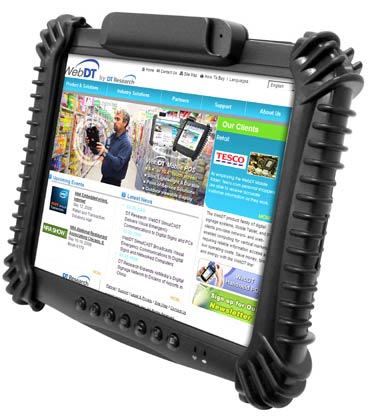|
DT Research WebDT 312
Lightweight mobile information appliance
(by Conrad H. Blickenstorfer)
DT Research, Inc., with headquarters in San Jose, California, develops and manufactures information appliances including tablet devices and digital signage solutions for vertical markets. For years, DT Research was clearly ahead of the times with its "web appliance" tablets, but today, tablets like the DT Research WebDT 312 shown here (and its WebDT 362 and WebDT 390 siblings) are increasingly being used as light and handy solutions for many mobile computing applications.

What historically separated initial "information appliance" products like earlier WebDT models from more traditional Tablet PCs was that they used the lower power x86-compatible processor families from AMD, VIA and Intel. Eventually, the market followed suit with Intel Atom-powered netbooks, showing that compact size, light weight and targeted performance definitely had their place.
The WebDT 312, a tech update to the WebDT310, is based on the 1.6GHz Intel Atom Z530 and supports Windows 7, Windows Embedded Standard 7, Windows XP Embedded, Windows XP for Embedded Systems, and also Linux (earlier versions also supported Windows CE). Depending on the OS, the WebDT 312 uses Flash or a solid state disk. DT Research offers the WebDT Device Manager, a comprehensive software management tool to remotely manage networked WebDT appliances.
The WebDT 312 is smaller and lighter than it looks. Its tough ABS + PC plastic housing has a footprint of 10.3 x 8.3 inches and is just 0.8 inches thick (the protective rubber bumpers add some thickness). Weight is just over two pounds. The 10.4-inch XGA (1024 x 768 pixel) display has a resistive touch screen and can be ordered in a outdoor-viewable version. Standard connectivity includes USB, LAN, microphone and headset jack, video-out, and onboard Bluetooth and WiFi.
Options such as a magnetic stripe card reader, front and rear 2-megapixel cameras, and 1D and 2D barcode scanners allow configuration for a wide variety of uses in many fields including inventory and warehousing, education, manufacturing, healthcare, finance, retail, control and monitoring, and hospitality. It can either be carried arround, used in a variety of cradles, or mounted via standard VESA mounts in vehicles, on arms, carts, walls or just about anywhere else.
How do the tablets in DT Research's current tablet lineup differ? They mostly use the same or very similar electronics, but display sizes (7 to 10.4 inches), aspect ratios (standard 4:3 or wide), and resolutions (800 x 480 to 1024 x 768) vary. Most are in the 2-3 pound range, All offer good protection via large rubber bumpers, but ruggedness specs vary, as does the availability of options such as RFID, mobile broadband, cameras, etc. For good overview of the DT Research lineup, see the DT Research tablet summary, their very informative page on optional features and technologies, and their handy comparison feature.
|









